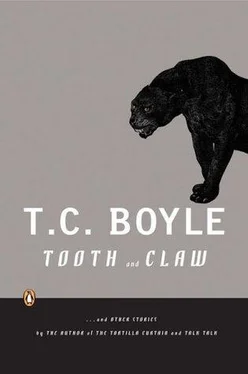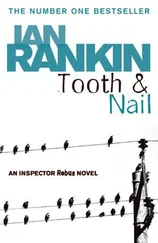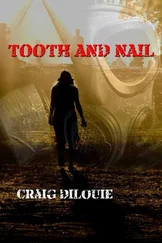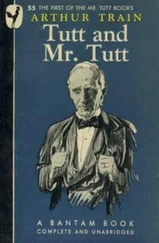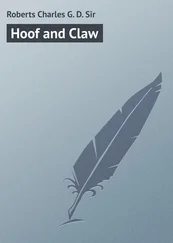Then he was there, fighting his way out of the car, and he had to hold to the door to keep from being blown away himself. The moor was as black as the hide of an Angus bull. The wind shrieked in every passage, scouring the heather till it lay flat and cried out its agony. He could hear the sea battering the cliffs below. It was then that the door of the minivan gave way and in the next instant he was coasting out over the scrub like a tobogganer hurtling down Burrafirth Hill, and there’ll be men to tell you it was a tree saved him from going over, but what tree could grow on an island as stingy as this? It was a thornbush is what it was, a toughened black unforgiving snarl of woody pith combed down to the ground with fifty years of buffeting, but it was enough. The shining white door of the minivan ran out to sea as if it would run forever, an awkward big plate of steel that might as well have been a Frisbee sailing out over the waves, but Robbie Baikie was saved, though the thorns dug into his hands and the wind took the hair off his head and flailed the beard from his cheeks. He squinted against it, against the airborne dirt and the darkness, and there it was, two hundred yards away and off behind him to the left: the crofter’s cottage, and with her in it. “Junie!” he cried, but the wind beat at the sound of his voice and carried it away till it was no voice at all. “Junie!”
As for her, the bird woman, the American girl with the legs that took the breath out of you and the face and figure that were as near perfection as any man here had ever dreamed of on the best night of his life, she never knew Robbie had come for her. What she did know was that the wind was bad. Very bad. She must have struggled against it and realized how futile it was to do anything more than to succumb to it, to huddle and cling and wait it out. Where were the birds? she wondered. How would they weather this — on their wings? Out at sea? She was cold, shivering, the fire long since consumed by the gusts that tore at the chimney. And then the chimney went, with a sound of claws raking at a windowpane. There was a crack, and the roof beams gave way, and then it was the night staring down at her from above. She clung to the andirons, but the andirons blew away, and then she clung to the stones of the hearth but the stones were swept away as if they were nothing more than motes of dust, and what was she supposed to cling to then?
We never found her. Nobody did. There are some who’ll say she was swept all the way to the coast of Norway and came ashore speaking Norse like a native or that a ship’s captain, battened down in a storm-sea, found her curled round the pocked safety glass of the bridge like a living figurehead, but no one really believes it. Robbie Baikie survived the night and he survived the mourning of her too. He sits even now over his pint and his drop of whisky in the back nook at Magnuson’s, and if anybody should ask him about the only love of his life, the bird woman from America, he’ll tell you he’s heard her voice in the cries of the kittiwakes that swarm the skies in spring, and seen her face there too, hanging over the black crashing sea on the stiff white wings of a bird. Poor Robbie.
RUMORS
IT WAS THE SEASON of mud, drainpipes drooling, the gutters clogged with debris, a battered and penitential robin fixed like a statue on every lawn. Julian was up early, a Saturday morning, beating eggs with a whisk and gazing idly out the kitchen window and into the colorless hide of the day, expecting nothing, when all at once the scrim of rain parted to reveal a dark, crouching presence in the far corner of the yard. At first glance, he took it to be a dog — a town ordinance he particularly detested disallowed fences higher than three feet, and so the contiguous lawns and flowerbeds of the neighborhood had become a sort of open savanna for roaming packs of dogs — but before the wind shifted and the needling rain closed in again, he saw that he was wrong. This figure, partially obscured by the resurgent forsythia bush, seemed out of proportion, all limbs, as if a dog had been mated with a monkey. And what was it, then? Raccoons had been at the trash lately, and he’d seen a opossum wavering down the street like a pale ghost one late night after a dreary overwrought movie Cara had insisted upon, but this was no opossum. Or raccoon either. It was dark in color, whatever it was — a bear, maybe, a yearling strayed down from the high ridges along the river, and hadn’t Ben Ober told him somebody on F Street had found a bear in their swimming pool? He put down the whisk and went to fetch his glasses.
A sudden eruption of thunder set the dishes rattling on the drain-board, followed by an uncertain flicker of light that illuminated the dark room as if the bulb in the overhead fixture had gone loose in the socket. He wondered how Cara could sleep through all this, but the wonder was short-lived, because he really didn’t give a damn one way or the other if she slept all day, all night, all week. Better she should sleep and give him some peace. He was in the living room now, the gloom ladled over everything, shadows leeching into black holes behind the leather couch and matching armchairs, the rubber plant a dark ladder in the corner and the shadowy fingers of the potted palms reaching out for nothing. The thunder rolled again, the lightning flashed. His glasses were atop the TV, where he’d left them the night before while watching a sorry documentary about the children purportedly raised by wolves in India back in the nineteen twenties, two stringy girls in sepia photographs that revealed little and could have been faked in any case. He put his glasses on and padded back into the kitchen in his stocking feet, already having forgotten why he’d gone to get them in the first place. Then he saw the whisk in a puddle of beaten egg on the counter, remembered, and peered out the window again.
The sight of the three dogs there — a pair of clownish chows and what looked to be a shepherd mix — did nothing but irritate him. He recognized this trio — they were the advance guard of the dog army that dropped their excrement all over the lawn, dug up his flowerbeds, and, when he tried to shoo them, looked right through him as if he didn’t exist. It wasn’t that he had anything against dogs per se — it was their destructiveness he objected to, their arrogance, as if they owned the whole world and it was their privilege to do as they liked with it. He was about to step to the back door and chase them off, when the figure he’d first seen — the shadow beneath the forsythia bush — suddenly emerged. It was no animal, he realized with a shock, but a woman, a young woman dressed all in black, with her black hair hanging wet in her face and the clothes stuck to her like a second skin, down on all fours like a dog herself, sniffing. He was dumbfounded. As stunned and amazed as if someone had just stepped into the kitchen and slapped him till his head rolled back on his shoulders.
He’d been aware of the rumors — there was a new couple in the neighborhood, over on F Street, and the woman was a little strange, dashing through people’s yards at any hour of the day or night, baying at the moon and showing her teeth to anyone who got in her way — but he’d dismissed them as some sort of suburban legend. Yet here she was, in his yard, violating his privacy, in the company of a pack of dogs he’d like to see shot — and their owners too. He didn’t know what to do. He was frozen there in his own kitchen, shadows undermining the flicker of the fluorescent tubes he’d installed over the counters, the omelet pan sending up a metallic stink of incineration. And then the three dogs lifted their heads as if they’d heard something in the distance, the thunder boomed overhead, and suddenly they leapt the fence in tandem and were gone. The woman rose up out of the mud at this point — she was wearing a sodden turtleneck, jeans, a watch cap — locked eyes with him across the expanse of the rain-screened yard for just an instant, or maybe he was imagining this part of it, and then she turned and took the fence in a single bound, vanishing into the rain.
Читать дальше
